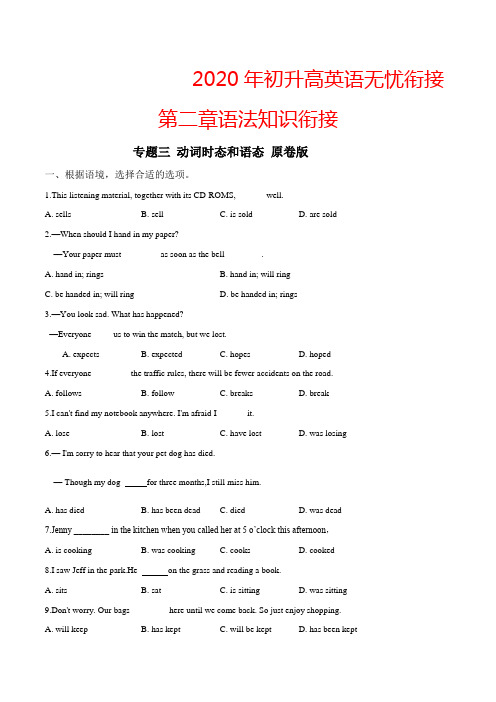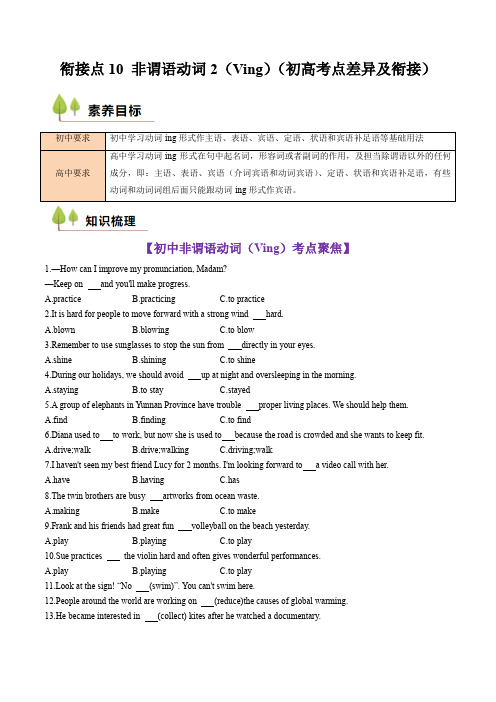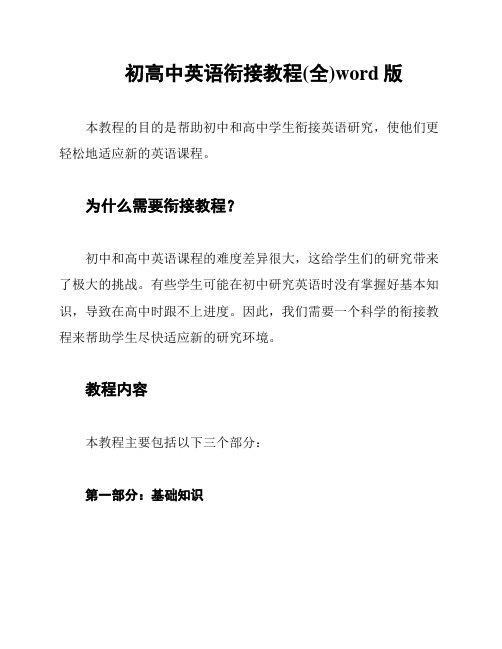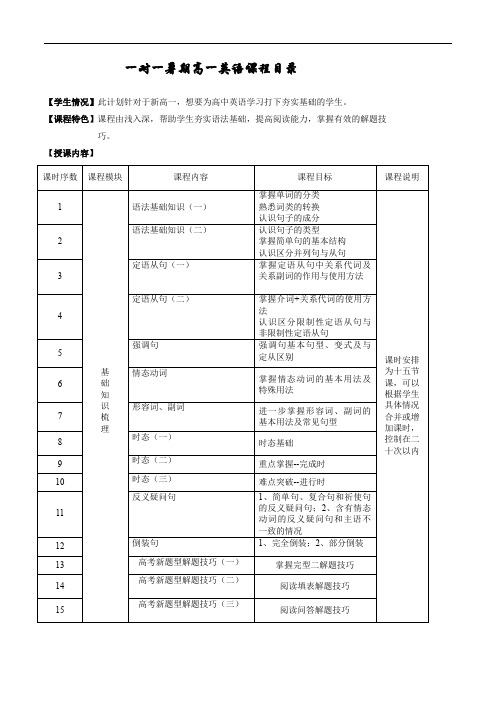初升高英语衔接班第2讲
Lesson+3+初升高衔接+时态+课件-2024-2025学年初高中英语衔接课程

She is to be married next month.
4.过去将来时 谓语动词形式:would do
用法:表示从过去某一时间看将要发生的动作或状态。 常用于宾语从句或间接引语中。
He said that he would wait for me at the gate.
If it doesn’t rain tomorrow, we’ll go on a picnic.
一般现在时
1.一般现在时
谓语动词形式:do/does/am/is/are
时间状语: sometimes,always, usually, seldom, every day, never, once a week...
1. 她到家之前她的孩子已经睡着了。 When she got home her children _h_a_d__sl_e_p_t_ (sleep). 2. 在他们到达之前电影已经开始了。 Before they arrived here, the film _h_a_d__ already _s_ta_r_t_e_d_ (start).
3.一般将来时
谓语动词形式
1.will/shall do 2.be going to do 3.be to do 4.be about to do
时间状语: tomorrow,in three days,next…,soon...
3.一般将来时
用法: 1)will/shall+动词原形
在书面语中,shall常用于第一人称 I/We。
6:00
7:00
Now 9:00
5.现在进行时
小升初英语衔接班讲义

小升初英语衔接班上课内容小升初英语衔接班第1讲模拟考试及英标学习小升初英语衔接班第2讲英语英标学习小升初英语衔接班第3讲交际用语小升初英语衔接班第4讲重点语法串讲(时态)小升初英语衔接班第5讲形容词比较级和最高级小升初英语衔接班第6讲重点语法串讲(初学简单句)小升初英语衔接班第7讲情态动词小升初英语衔接班第8讲 50个绝佳口语句型(一)小升初英语衔接班第9讲 50个绝佳口语句型(二)小升初英语衔接班第10,11讲:Unit 1小升初英语衔接班第12,13讲:Unit 2小升初英语衔接班第14,15讲:Unit 3小升初衔接之英语学法指导(二)从词汇入手学习初中英语小升初英语衔接班第16讲一般现在时、现在进行小升初英语衔接班第1讲模拟试题【模拟试题】一. 选择填空。
()1. Mr. Crisp is _____ English teacher, but Mrs. Sue is _____ teacher of English.A. an ; anB. an ; aC. a ; a()2. —Good morning, Miss Williams. _____—How do you do?A. Nice to see you!B. How do you do.C. Fine, thank you.()3. —What’s this in English? ______A. This is a bag.B. It is bag.C. It’s a bag.()4. What are _____ and ______? A. she ; him B. her ; he C. she ; he ()5. ______ old are you? A. How B. What C. how ()6.What’s that ______ English? A. a B. an C. in()7. ______ can I get to the Great Wall. A. What B. How C. Do()8. _____ is the post office? A. What B. How C. Where()9. Can you count from zero _____ ten? A. up B. to C. down()10. ______ your mother a teacher? A. Are B. Is C. Am二. 写出反义词。
2020年初升高英语无忧衔接第二章语法知识衔接

2020年初升高英语无忧衔接第二章语法知识衔接专题三动词时态和语态原卷版一、根据语境,选择合适的选项。
1.This listening material, together with its CD-ROMS, ______ well.A. sellsB. sellC. is soldD. are sold2.—When should I hand in my paper?—Your paper must ________ as soon as the bell ________.A. hand in; ringsB. hand in; will ringC. be handed in; will ringD. be handed in; rings3.—You look sad. What has happened?—Everyone ____ us to win the match, but we lost.A. expectsB. expectedC. hopesD. hoped4.If everyone ________ the traffic rules, there will be fewer accidents on the road.A. followsB. followC. breaksD. break5.I can't find my notebook anywhere. I'm afraid I ______ it.A. loseB. lostC. have lostD. was losing6.— I'm sorry to hear that your pet dog has died.— Though my dog for three months,I still miss him.A. has diedB. has been deadC. diedD. was dead7.Jenny ________ in the kitchen when you called her at 5 o’clock this afternoon,A. is cookingB. was cookingC. cooksD. cooked8.I saw Jeff in the park.He on the grass and reading a book.A. sitsB. satC. is sittingD. was sitting9.Don't worry. Our bags ________ here until we come back. So just enjoy shopping.A. will keepB. has keptC. will be keptD. has been kept10.There ________ a sports meet next week. The students feel very excited.A. is going to haveB. are going to beC. is going to be11.—Have you finished the poster for the party?—Not yet.I it in two days.A. finishB. finishedC. will finish12.In the past few years, great changes______ in Lianyungang.A. take placeB. took placeC. have taken placeD. have been taken place13.—When will A Bite of China II begin tonight?—It ____ for ten minutes.A. will beginB. has begunC. will be onD. has been on14.Tom ________ Kate since two years ago, and they have had a child.A. got married toB. has been married toC. has been married withD. married15.—Who was calling just now?—I donˈt know. By the time I picked up the phone, it _____.A. has stoppedB. would stopC. had stopped16.By the time I got to the cinema , the movie _______for 15 minutes .A. had been onB. had startedC. has been onD. has started17.He will _______ if he_______ late again, I think.A. punish; will comeB. be punished; will comeC. punish; comesD. be punished; comes18.-Hurry up! The meeting _________ in five minutes.-I’m sorry. I met a traffic jam.A. beganB. will beginC. begins19.-I don’t know if Mr. Wang ________.-I think he ________ if it doesn’t rain.A. will come; comesB. will come; will comeC. comes; comesD. comes; will come20.— Jane ________ her mistakes since she talked with her teacher.—She is really a good girl.A. realizesB. was realizingC. has realizedD. realized21.When you a difficult task, try to continue with it and finish it.A. giveB. are givingC. gaveD. are given22.We're sure that the environment in our city ______ greatly through our work in the near future.A. improvedB. was improvedC. has improvedD. will be improved23.—Do you know the famous artist in red?—Sure. He _________ to the art festival in our city every year.A. invitesB. invitedC. is invitedD. was invited24.A knife can ______ cutting things.A. be used forB. be used byC. used toD. use for25.The new film The Left Ear by Su Youpeng a few months ago, who is also a famous singer.A. is directedB. was directedC. directedD. directs26.Cigarettes must ______ before you go into a room.A. put outB. be put outC. put upD. be put up27.Look at our new school. It ____ last year.A. builtB. was builtC. is builtD. will be built28.The room _______ every day. You can live it now.A. cleansB. is cleaningC. is cleanedD. has cleaned29.-How long haven't you been on vacation?-For a year. I will go to Mexico for a trip when my season project ________.A. is finishedB. have been finishedC. will be finishedD. has finishedlions of red envelopes (红包) out on the eve of the Spring Festival.A. sendB. was sentC. were sendingD. were sent二、用括号内单词的适当形式填空。
超实用初升高英语无忧衔接:衔接点10 非谓语动词2(Ving)(初高考点差异及衔接)(原卷版)

衔接点10 非谓语动词2(Ving)(初高考点差异及衔接)初中学习动词-ing形式作主语、表语、宾语、定语、状语和宾语补足语等基础用法初中要求1.—How can I improve my pronunciation, Madam?—Keep on and you'll make progress.A.practiceB.practicingC.to practice2.It is hard for people to move forward with a strong wind hard.A.blownB.blowingC.to blow3.Remember to use sunglasses to stop the sun from directly in your eyes.A.shineB.shiningC.to shine4.During our holidays, we should avoid up at night and oversleeping in the morning.A.stayingB.to stayC.stayed5.A group of elephants in Yunnan Province have trouble proper living places. We should help them.A.findB.findingC.to find6.Diana used to to work, but now she is used to because the road is crowded and she wants to keep fit.A.drive;walkB.drive;walkingC.driving;walk7.I haven't seen my best friend Lucy for 2 months. I'm looking forward to a video call with her.A.haveB.havingC.has8.The twin brothers are busy artworks from ocean waste.A.makingB.makeC.to make9.Frank and his friends had great fun volleyball on the beach yesterday.A.playB.playingC.to play10.Sue practices the violin hard and often gives wonderful performances.A.playB.playingC.to play11.Look at the sign! “No (swim)”. You can't swim here.12.People around the world are working on (reduce)the causes of global warming.13.He became interested in (collect) kites after he watched a documentary.【高中非谓语动词(Ving)考点聚焦】考纲解读动词-ing形式也是一种非谓语动词,由“动词原形+ing”构成,因此具有动词的性质,有时也相当于一个名词、形容词或副词。
高中英语教学课件:初升高英语衔接

感官:smell, feel, taste,
sound, look --变化:become, get, turn,
go, come, grow --持续:remain, stay, keep,
continue --表象:seem, appear,
look --终止:prove, turn out---
状语
• 状语用来修饰动词,形容词或副词.它表示行为发 生的时间,地点,目的,方式,程度.一般由副词 ,介词短语,不定式或相当于副词的词或短语充当 ,也可由从句来充当.
He did it carefully.
Without his help, we couldn’t work it out.
In order to catch up with my classmates, I must study hard.
初升高英语衔接
距离高考还有一段时间,不少有经验的老师都会提醒考生,愈是临近高考,
能否咬紧牙关、学会自我调节,态度是否主动积极,安排是否科学合理,能不 能保持良好的心态、以饱满的情绪迎接挑战,其效果往往大不一样。以下是本 人从事10多年教学经验总结出的超实用新高考英语专题复习讲义希望可以帮助 大家提高答题的正确率,希望对你有所帮助,有志者事竟成!
draw, run, is
修饰动词、形容词或其他副词
not, fast, often
介词
Preposition (prep.)
表示名词、代词等和句中其他词的关系
in, on, of
连词 感叹词
Conjunction (conj.) Interjection (interj.)
用来连接词与词、短语与短语或句与句 表示说话时的喜悦、惊讶等情感
初高中英语衔接教程(全)word版

初高中英语衔接教程(全)word版
本教程的目的是帮助初中和高中学生衔接英语研究,使他们更轻松地适应新的英语课程。
为什么需要衔接教程?
初中和高中英语课程的难度差异很大,这给学生们的研究带来了极大的挑战。
有些学生可能在初中研究英语时没有掌握好基本知识,导致在高中时跟不上进度。
因此,我们需要一个科学的衔接教程来帮助学生尽快适应新的研究环境。
教程内容
本教程主要包括以下三个部分:
第一部分:基础知识
这一部分主要介绍初中英语必修知识点以及高中英语的基本知识,如语法、词汇、基本句型等。
学生可以通过研究这一部分内容加强基础,为后续研究打下坚实的基础。
第二部分:交际能力
高中英语注重交际能力的培养,因此这一部分主要介绍交际技能、阅读技巧、写作技巧等方面的知识点。
通过研究这些内容,学生可以更好地完成高中英语课程要求。
第三部分:拓展知识
除了基础知识和交际技能,高中英语还有一些拓展内容,如文学知识和文化知识等。
学生可以通过研究这一部分内容加深对英语的理解和认识。
总结
本教程是一个全面的初高中英语衔接教程,内容全面、有针对性,旨在帮助学生更好地适应新的英语课程。
希望广大学生能够认真学习,取得更好的成绩。
初升高英语衔接内容介绍

一对一暑期高一英语课程目录【学生情况】此计划针对于新高一,想要为高中英语学习打下夯实基础的学生。
【课程特色】课程由浅入深,帮助学生夯实语法基础,提高阅读能力,掌握有效的解题技巧。
【授课内容】精彩内容片段: 倒装句精益导读If you don’t learn to think when you are young, you may never learn. (Thomas Edison, American inventor)如果你年轻时就没有思考,那么就永远学不会思考。
(美国发明家爱迪生.T.)益思精析主语和谓语有两种顺序:主语在前,是自然语序;主语在后,是倒装语序,又分为全部倒装句和部分倒装。
全部倒装:把整个谓语部分放在主语之前。
注意:谓语动词的数要与后面主语保持一致。
1. 用于地点副词here, there, 方位副词out, in, up, down, away及时间副词now, then等开头的句子里,以示强调铃声响了。
看,他们来了。
倒装要求:主语必须是名词,主语是人称代词时,主语和谓语语序不变。
在这儿。
他走了。
这类倒装句式一般只用一般现代时和一般过去时。
男孩儿们冲了出去。
2. 当表示地点的介词短语放句首时使用全部倒装。
此时谓语多为be, lie, sit, stand, come, walk等不及物动词;倒装时不需要助动词。
桌子地下是三只猫。
塔前面流过一条小溪。
3. there放句首时,要用全部倒装句式。
在“there+be”结构中的谓语动词有时不用be,而用表示类似“存在”观念的其他不及物动词。
如:live, stand, come, lie, flow, enter, rise和appear等。
河中传来呼救声。
许多年前在一栋木房子里住着一个老人。
4. 表语置于句首时,倒装结构为“表语+系动词+主语”。
(1) 形容词+系动词+主语到会的是格林先生,一个校长。
(2) 过去分词+系动词+主语躲在门后面的是一些顽皮的孩子。
初高中英语衔接课程(共37张PPT)

如何应对高中的英语学习?
从总体上要注意以下几点:
1、要点滴积累,不要急于求成。 2、要把握英语学习的规律,善于积累。
3、要树立信心,不要妄自菲薄。 4、要做到博闻强识,加强背诵。
从总体上要注意以下几点:
1、要点滴积累,不要急于求成。
记住:Rome isn’t built in a day!
(2)高中要学习3500左右的单词,对基础不同的 同 学要把单词分类,常用单词要会应用,书面表 达中要用到。使用频率低的单词知道意思就行了。 结构复杂、意思复杂、望文生歧义的单词要会运用。 如:
tg进ue打rt展na开o、lonn与,gtu…w关rin和t掉ho睦fsfb相; ./处pstuh穿t.,o上n,g通po脱u过tt掉ho、rfof用ug完h 、 巧适记当词展单拓
有志者事竟成
Skill comes from practice. Practice makes perfect.
熟能生巧
一、初高中英语学习的区别 二、如何应对高中的英语学习 三、高考题型 四、英语自学能力的培养
高中英语学习不是新起点,而是初中英 语学习的继续和深入,因此对初中英语 知识的掌握是高中英语学习的基础,但 两者又有区别。
尊 敬 老 人 是 华民族 的传统 美德。 古人云 :“老吾 老以及 人之老 。”千 百年来 ,华儿女 也 用 自 己 的 言行不 断充实 、丰富 着敬老 思想。
我 们 希 望 通 过此次 在简朴 寨内开 展慰问 孤寡老 人的活 动,一方 面关爱 老人,给他们送 去 一 份 温 暖 与关爱 ,给予孤 寡老人 以关注 ;另一 方面,增 强大学 生的社 会责任 感,丰富 业 余 生 活 ,为 大学生 提供在 学习之 余参与 社会实 践的机 会,使他 们接触 社会,了 解社
- 1、下载文档前请自行甄别文档内容的完整性,平台不提供额外的编辑、内容补充、找答案等附加服务。
- 2、"仅部分预览"的文档,不可在线预览部分如存在完整性等问题,可反馈申请退款(可完整预览的文档不适用该条件!)。
- 3、如文档侵犯您的权益,请联系客服反馈,我们会尽快为您处理(人工客服工作时间:9:00-18:30)。
1 / 10 一. 本周教学内容 初升高英语衔接班第2讲 初中基础知识疏理(2)
二. 重、难点 有关简单句、复合句及并列句的知识疏理: 1. 简单句: (1)定义:只有一个主语(或并列主语)和一个谓语(或并列谓语)的句子叫简单句,如:We learn English . 我们学英语。(一个主语和一个谓语) Both Xiao Zhang and Xiao Wang are from Beijing . 小张和小王都是北京人。(一个并列主语和一个谓语) He once lived and worked here . 他曾经在这里居住和工作过。(一个主语和一个并列谓语) My father and mother go to work at seven in the morning and come back home at eight in the evening . 我父母早上七点上班,晚上八点回家。(一个并列主语和一个并列谓语) (2)分类:上次我们对简单句按照句子基本结构分出的5种类型做了阐述;另外,根据句子的功能或使用目的,简单句可分四类:陈述句、疑问句、祈使句、感叹句。 2. 并列句: (1)定义:用并列连接词连接起来的两个或两个以上简单句叫做并列句。 (2)并列句的构成:简单句+连接词+简单句 (3)连接并列句常用的连接词:and , but , or , so , not only … but also , however , neither…nor , either…or , still等。 eg. I help her and she helps me . 我帮她,她帮我。 He is very old but he is in good health . 他年纪很大了,但他身体很好。 We must hurry or we’ll be late . 我们得赶快走,不然就晚了。 This girl did her work carefully , so she never made any mistakes . 这个姑娘工作认真,从不出差错。 Jim not only wrote to me last week but also came to see me yesterday . 吉姆上星期不但写信给我,而且昨天还来看过我。 Neither could theory do without practice, nor could practice do without theory . 理论没有实践不行,实践没有理论也不行。 Either he is to blame or I am . 不是他该受责备,就是我该受责备。 注意:连接词so除起连接并列句作用外,兼有结果意味;有时so在后一句中代替前一句中某一句中成分。例如: He can swim , so can I . 他会游泳,我也会。(so代替swim) Iron is a kind of matter , so are water and air . 铁是一种物质,水和空气也是物质。(so在后一句中起表语作用) 3. 主从复合句 (1)定义:主从复合句是由一个主句和一个或一个以上的从句构成的。主句是句子的主体,从句可视作句子的一个成分。从句在主从复合句中可起主语、宾语、表语、定语、状语作用。从句在全句中起什么作用,就叫什么从句。 (2)状语从句:状语从句在句中起状语作用,修饰主句中的谓语动词、形容词或副词。2 / 10
在初中阶段我们主要学习了以下几种状语从句: ① 时间状语从句:常见引导词:when(当……时),as(一边……一边,当……时),while(在……过程中),before(在……以前),after(在……之后),since(自从……以来),till(until)(直到……,直到……才),as soon as(一……就……)等。 进入高中阶段之后,我们还会再见到另外一些常用的连接词。在由以上连接词或词组连接的主从复合句中,主句谓语动词所表示的动作和从句谓语动词所表示的动作有时是同时发生、有时是先后发生。因此,在理解和运用带时间状语从句的主从复合句时,要根据连接词所表示的不同时间意义,特别注意主句和从句的谓语动词的时态。这是掌握时间状语从句的关键。 ② 原因状语从句:常由because(因为),since(既然),as(由于)等连接词引导。 eg. He didn’t hear the knocking at the door because he was listening to the radio . 他没听见敲门声,因为他正在听收音机。 Since you are free today , you had better help me with my English . 既然你今天休息,你最好帮我学习英语。 As the day was fine , they decided to go on a trip . 由于天气好,他们决定作一次短途旅行。 ③ 地点状语从句: 常由where(在……地方),wherever(无论……在哪儿)等连接词引导。 如: I’ll go where work conditions are difficult . 我愿意到工作条件困难的地方去。 Wherever you are , you should work for the people heart and soul . 无论你在哪里工作,你都应该全心全意为人民服务。 ④ 条件状语从句:常由if(假如,如果),unless(除非)等连接词或连接词组引导。如: If I go to the Great Wall tomorrow , would you like to come along ? 如果明天我去长城,你会和我一起去吗? He is sure to come unless he has some urgent work to do at home . 除非他家里有急事要办,不然他一定会来的。 ⑤ 比较或方式状语从句:常由as…as(像…一样),than(比),the…the(越……就越),as(正如),as if(似乎,好象)等引导。如: I know you better than she does . 我比她更了解你。 The more you practice , the more knowledge you will get . 你实践得越多,你得到的知识就越多。 You should study English as hard as Mary does . 你应该像玛丽那样努力学习英语。 The old man runs very fast as if he were a young man . 这位老人跑得很快,简单像个年轻人。(在以as if连接的从句中,谓语动词用过去式,系动词were可用于所有人称,表示虚拟语气,而不是真实情况。) ⑥ 目的状语从句:常由so(使得),that(以便),so that(为了,使得),in order that(这样……就)等来引导。如: They set out early that they might arrive at the station in time . 他们很早出发,以便及时赶到车站。 She takes notes carefully in class so that she may use them when she reviews her lessons 3 / 10
after class . 她在课上认真记笔记,以便能在课下利用它们复习功课。 ⑦ 结果状语从句:常由so(结果),so that(结果),so…that(such…that)(如此……以致……)等连接词引导。如: Everybody lent a hand , so the work was done in time . 人人帮忙,结果工作及时完成。 He finished his homework so well that his teacher praised him in class . 他作业完成得很好,结果他的老师在班上表扬了他。 The film was so interesting that I enjoyed it very much . 这部电影这么有趣(以致于)我非常喜欢它。 It is such a heavy box that nobody can move it away . 这是一个很重的箱子,谁也搬不走。 ⑧ 让步状语从句:常由though(although)(虽然……但……),even if(即使),however(不管怎样),whatever(无论什么),no matter how(who…)(不管多么……)(无论谁……)等连接词或连接词组引导。如: He went to school , though he was ill . 虽然他病了,但还是去上学了。(注意:有(al)though的句子,就有“虽……但是”的含义,不能在主句中用but,但可接yet,still等。) She carried on the job even if she had a bad cold . 即使她患了重感冒,她还是坚持工作。 However much I tried , I failed to work out the maths problem . 无论我怎么做,都算不出这道数学题来。 Whatever you say , I will not change my mind . 不论你怎么说,我都不会改变主意。 He keeps taking physical training in winter no matter how cold it is . 不论天气多冷,他都坚持在冬天进行体育锻炼。 No matter who asks her for help , she is ready to help . 无论谁请她帮忙,她都愿意帮助。 (3)定语从句: 在复合句中修饰名词或代词的从句叫做定语从句。被定语从句修饰的名词或代词叫做先行词,定语从句必须放在先行词之后。 引导定语从句的关系代词有who , whom , whose , which , that等。这些是我们在初中已学习过的,对于它们的用法已经在以前的讲解中多次提到过,主要掌握它们指代人还是物,在句中可以充当什么成分。 引导定语从句的关系副词有where , when , why等,这些是高中要学习的内容,在后面的讲解中我们会渗透其用法及定语从句其他内容。 (4)名词性从句: 在主从复合句中,从句可以起主句的主语、表语、宾语或同位语作用在多数情况下,这四种句子成分由名词性词类充当,所以起这四种成分作用的从句统称为名词性从句。 引导名词性从句的关联词有:连接词that , whether , if;疑问代词who , what , which , whose;疑问副词when , where , how , why等。在这四种从句中,我们已学过的是宾语从句,其他三种在课文中偶尔出现过,只要求理解,宾语从句是必须掌握的内容,对于它的三要素也已多次复习过,请同学们认真学习并将有关练习题做好,为今后学习其他三种名词性从句打好基础。
